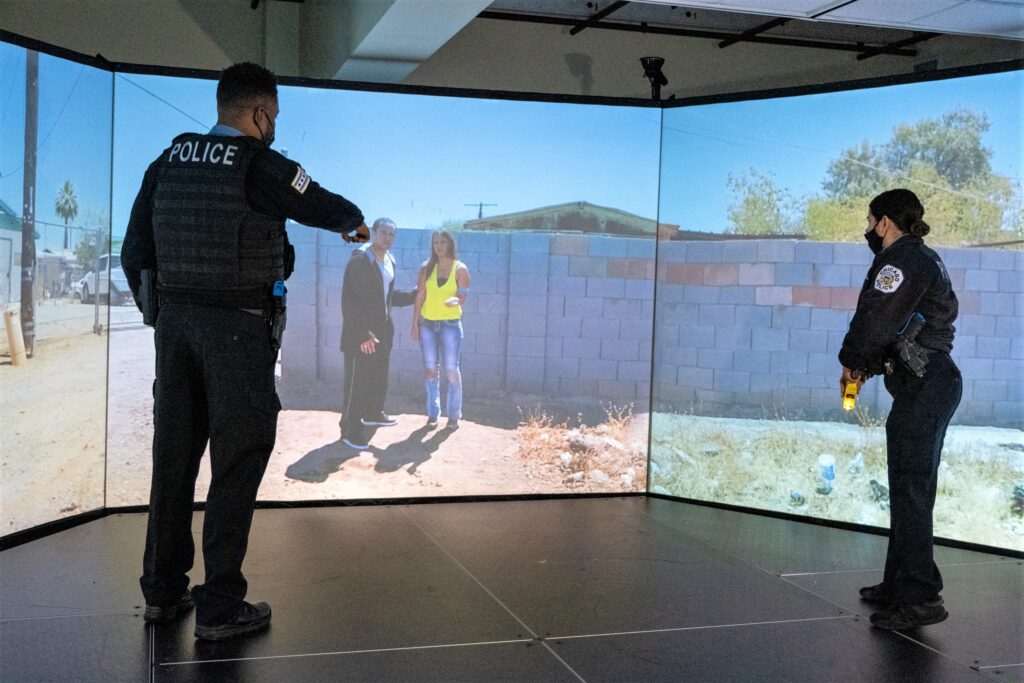Situational Decision-Making (Sit-D)

The Crime Lab and the Chicago Police Department (CPD) partnered to create and evaluate a behavioral science-informed training that helps improve officer decision-making in ambiguous, high-stress situations.
Challenge
Officers often respond to high-stress calls that give them just a few moments to make decisions that have life-or-death consequences, but available police trainings fail to provide officers with the necessary tools to make crucial judgment calls.
Opportunity
The Crime Lab helped design, implement, and evaluate a new hands-on, situation-based training that teaches officers to examine their default thinking and assumptions in stressful situations. Situational Decision-Making (Sit-D) incorporates insights from behavioral science to help officers consider different perspectives on the situations they’re in and, as a result, different options for how to respond. Following the training, Sit-D trained officers were 23% less likely to use force and made 23% fewer discretionary arrests without an accompanying decline in productive policing activity like warrants and firearm recoveries.
Project overview
Interested in starting a conversation about possibly bringing Sit-D to your department?
In recent years, high-profile use-of-force incidents by police officers have increasingly led to calls for a reexamination of policing in America. Prevailing views suggest that adverse policing outcomes (e.g., excessive force, unnecessary arrests) are driven by problematic officers or deficient department policies. Proposed solutions often focus on levers like changing police hiring standards and improving accountability. While these levers are undoubtedly important, they also overlook a critical aspect of policing itself. Police work often involves making complex decisions in high-stress situations that require officers to act quickly. Without adequate training, these situations can undermine effective decision-making, leading to the adverse outcomes. As a critical part of police reform, officers therefore need trainings that provide them with the necessary cognitive tools to navigate these demanding situations.
Officers respond to high-stress calls that give them just a few moments to make decisions that have life-or-death consequences — but available police trainings fail to provide them with the necessary cognitive tools to make crucial judgments.
The University of Chicago Crime Lab and the Chicago Police Department (CPD) partnered to evaluate Situational Decision-Making (Sit-D), a behavioral science-informed training program that helps improve officer decision-making when handling the complex, high-stress situations that officers often encounter. CPD ran the training from 2020-2021 for over 1,000 officers in a way that allowed for rigorous analysis.
Read more about the findings below.
Years Active
2018 – present
Topics
Project Leads
Jordan Bellquist
Research Manager

Anthony Berglund
Associate Director of Project Management

Oeindrila Dube
Philip K. Pearson Professor of Global Conflict Studies

Khoa Nguyen
Analytics Manager

Sandy Jo MacArthur
Former Assistant Chief, Los Angeles Police Department

Anuj Shah
Associate Professor of Behavioral Science

The evaluation found that the training was:
- Designed to challenge assumptions on the job. Sit-D aims to improve public safety and reduce excessive police use of force through a high-impact intervention that teaches officers to question their default thinking and assumptions when assessing a stressful environment. In particular, it teaches officers how to avoid cognitive biases, so they can proactively consider multiple interpretations of these situations, instead of acting on the basis of their default assumptions.
- Aimed at improving decision-making in real-time. Most approaches to police reform emphasize individual officer accountability or improving department policies to address problematic actors. While those efforts are crucial, they aren’t enough on their own. Sit-D provides officers with decision-making tools to navigate stressful situations and prevent adverse outcomes before they occur.
- More engaging and comprehensive. Whereas most police trainings are delivered through lectures over one or two days, Sit-D is delivered in small classes and short sessions over several months. It employs a mix of lectures, scenario-based simulation, and peer discussion to increase engagement.
Read more about the program below.
Both the content and structure of Sit-D are unique for a law enforcement training. The training content is designed to help officers navigate high-stakes situations, which tend to be ambiguous and difficult to diagnose. Decades of psychology research tell us that in these types of situations, people naturally let their intuitive assumptions guide their actions, instead of thinking proactively and considering multiple possibilities. The Sit-D training provides tools that officers can use to consider alternative interpretations of a situation before they settle too quickly on a course of action.
Whereas most police trainings occur in one several-hour block or over one or two days, Sit-D was designed to be delivered in a sequence of sessions over a period of several months to increase officers’ retention of the material. The course employs a mix of lecture, discussion, and simulator exercises to teach officers situational awareness, continuous assessment, and emotional regulation. The training does not tell officers what they should or should not do during specific incidents. Instead, it teaches officers to recognize situations where they may be likely to use mental shortcuts (like over-generalizing based on their past experiences) and it shows officers how these types of thinking traps can interfere with how they assess the situation.
Officers then practice using the time they have to consider multiple interpretations as difficult situations unfold. Key course concepts are introduced during classroom lectures and put into practice during simulator exercises. This allows officers to practice their critical thinking and assessment skills in a safe environment prior to applying the skills in the field. Upon conclusion of practice scenarios, in-depth debriefs facilitate discussions of the assumptions officers made and how those assumptions influenced responses and outcomes.
Sit-D trained officers were 23% less likely to use force. The training also led to a 23% reduction in discretionary arrests, a category that includes charges such as disorderly conduct and obstructing an officer.
The Results
Sit-D shows evidence-based trainings can improve policing. The study’s authors evaluated the pilot of the Sit-D program using a randomized controlled trial of CPD officers from 2020 to 2021, and found that it resulted in:
- Fewer uses of force and discretionary arrests. Sit-D trained officers were 23% less likely to use force. The training also led to a 23% reduction in discretionary arrests, a category that includes charges such as disorderly conduct and obstructing an officer – minor offenses that can be viewed as unnecessary and arbitrary, while holding little public safety value.
- Fewer racial disparities in policing. Sit-D reduced overall arrests of Black individuals by 11%. In other words, teaching officers to recognize and avoid cognitive biases has the potential to reduce racial disparities in policing.
- No drop in other policing activity. The study observed no change in an array of other police activities (e.g., firearm recoveries, drivers’ stops, warrants and citations).
- Fewer officer injuries. Sit-D also led to a 49% reduction in days off officers took due to injuries. In fact, the cost savings from this reduction in injuries alone more than offsets the cost of the training. And given a host of other benefits to the training (e.g., fewer physical or psychological costs to the community from arrests and uses of force), this suggests the training is cost effective.
- More confidence and better stress management. Officers who completed the training reported greater confidence and demonstrated changes in how they regulate emotions and the strategies they use to cope with stress.
To learn more about these results, please contact Daniel Kim, at daniel.kim@uchicago.edu.

Officers face high-stress situations that require quick thinking under pressure, but there has been surprisingly little investment in the lever that directly addresses improving this type of decision-making: behavioral science-informed police officer training. What’s more, even though Sit-D wasn’t designed to tackle racial bias in policing, its ability to effectively utilize behavioral science informed training actually has the potential to reduce glaring racial disparities in the field.
Executive Director, University of Chicago Crime Lab

When an officer responds to a call for service, they often have a few moments to make life-and-death decisions, which means they’re likely relying on snap judgments to guide their response. Sit-D is designed to help officers navigate the cognitive demands inherent in policing, and our research shows that it works to make policing more effective and equitable.
Professor of Global Conflict Studies, University of Chicago
Latest Updates
Oeindrila Dube on Cognitive Behavioral Training for Police
In this episode of Probable Causation, Dr. Oeindrila Dube discusses her research on Situational Decision-Making, a cognitive behavioral training program for police.

As Use of Force Incidents Lead to Calls for Policing Reform, New Behavioral Science-Based Police Training Found to Reduce Adverse Policing Outcomes and Racial Disparities in Arrests
The Situational Decision-making (Sit-D) program cut use-of-force incidents by 23% and significantly reduced disproportionate arrests of Black civilians.

A New Tactic for Police Reform: Using Behavioral Economics to Curb Unnecessary Arrests
In this podcast, Crime Lab affiliates Oeindrila Dube and Anuj Shah discuss their research on Situational Decision-Making, a behavioral science-informed training program that helps improve officer decision-making when handling the complex, high-stress situations that officers often encounter.


NBER Working Paper: A Cognitive View of Policing
Read the working paper published by the National Bureau of Economic Research.

Webinar – Situational Decision-Making: A New Training to Improve Policing
The Crime Lab hosted a webinar on the findings of our recently released study, A Cognitive View of Policing, which evaluated a pilot of the Situational Decision-Making (Sit-D) police training program.
BFI Research Brief: A Cognitive View of Policing
Read the research brief published by the Becker Friedman Institute (BFI) for Economics at the University of Chicago.
